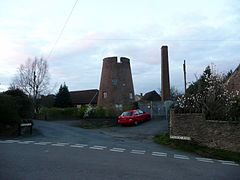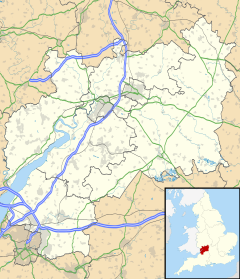Frampton Cotterell
| Frampton Cotterell | |
|---|---|
 'The Windmill' and Windmill Cottage on Ryecroft Road, Brockeridge, 2009. Click image for more information |
|
| Frampton Cotterell shown within Gloucestershire | |
| Population | 6,520 (2011) |
| OS grid reference | ST670818 |
| Civil parish |
|
| Unitary authority | |
| Ceremonial county | |
| Region | |
| Country | England |
| Sovereign state | United Kingdom |
| Post town | BRISTOL |
| Postcode district | BS36 |
| Dialling code | 01454 |
| Police | Avon and Somerset |
| Fire | Avon |
| Ambulance | South Western |
| EU Parliament | South West England |
| UK Parliament | |
Frampton Cotterell is a village and parish, in South Gloucestershire, South West England, on the River Frome. The village is contiguous with Winterbourne to the south-west and Coalpit Heath to the east. The parish borders Iron Acton to the north and Westerleigh to the south-east, the large town of Yate is 3 miles (4.8 km) away. The village is 8.7 miles (14 km) north-east of the city of Bristol.
The village has evolved from a once rural Gloucestershire village, to a partial dormitory village for Bristol. The population according to the UK crime statistics was around 9,385 and is increasing. The population was remeasured at the 2011 census and came to 6,520 for the parish alone.
Very little archaeological work has taken place in the Frampton Cotterell area so knowledge of the area prior to the Anglo-Saxon arrival is limited. Local historians tend to use field names and street names to work out the distant history of the village. It is believed from place names that there were two settlements in the area in the Roman times. One centred on the group of shops at the Church Road/Frampton End Road junction, where the name Dullage survived until the 1940s. The second was in rural farmland west of Cogmill in between Frampton Cotterell and Iron Acton, here several fields held the name Chessolds from the old English 'ceastel' meaning 'a heap of stones'.
The name Frampton means 'the settlement (farmstead or village) on the Frome'. Frampton Cotterell was recorded as Frantone in the Domesday Book (1086). All the other local villages (Westerleigh, Stoke Gifford and Winterbourne) also have Old English names, suggesting they were either conquered or resettled between 577 and 1066.
...
Wikipedia

